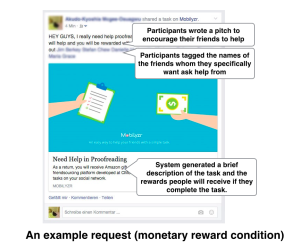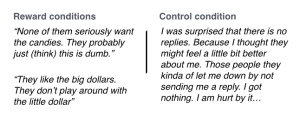CHI Preview: Making the Most of Your Facebook Friends
Author: Susie Cribbs (CMU,Web Communications Specialist). Originally posted on HCII website.
Everyone has that friend — the one who takes to Twitter or Facebook to ask their followers for advice on a new appliance, questions about logistics for an upcoming event, or even which movie they should see on Saturday. In the human-computer interaction field, this sort of behavior is called “friendsourcing,” and researchers have long been attempting to build systems that tap into this largely unexplored resource. But friendsourcing requests often go unanswered even when they require only a simple answer. Larger requests that involve tasks, like proofreading a resume, may be ignored because they require more time than friends are willing to provide. Asking friends for this kind of help could also hurt the requester’s reputation.
The solution to attracting more respondents might seem simple: provide incentives for their help. But some studies show that offering rewards can sometimes result in fewer replies or, worse, ruined relationships. A team of HCII researchers recently tried to discover exactly what happens when you offer friends rewards for their online help in the paper “A Market in Your Social Network: The Effects of Extrinsic Rewards on Friendsourcing and Relationships.” The paper, which received an honorable mention award, will be presented at the Association for Computing Machinery Conference on Human Factors in Computing Systems (CHI 2016), May 7–12 in San Jose, Calif. Authors include Haiyi Zhu, an HCII Ph.D. alumna who is now an assistant professor at the University of Minnesota; HCII Ph.D. student Sauvik Das; alumna Yiqun Cao; Associate Professor Aniket Kittur and Professor Robert Kraut.
Through a randomized, controlled experiment, the HCII set out to answer two questions: does adding extrinsic rewards to a friendsourcing request increase or decrease the response rate for the requests? And does it change how requesters view the strength of their relationships with friends who respond?
For their experiment, the researchers recruited Facebook users willing to request help from people in their friends list. Some participants were kept in a control group that made no mention of payment or reward in their request, while others were split into groups: two that offered small or large monetary awards for request responses, and two that offered small or large non-monetary rewards (in this case, candy). Each participant was required to post two requests — a pre-set task involving either completing survey or revising a document; and a request of the participant’s creation. Participants then had to tag six friends in each request, and complete pre- and post-experiment surveys that explored their feelings for the friends they tagged.
Using the data from 105 task requests, the researchers found that offering extrinsic rewards has mostly positive effects on friendsourcing. Both large monetary and large non-monetary rewards substantially increased response rates without undermining friendships. In fact, the presence of a reward allowed the requesters to develop a face-saving explanation for why their friends were unresponsive. A failure to receive help from a friend could be attributed to the friend’s desire for candy or an Amazon gift card, not the quality of the friendship.
“These results provide new theoretical insights into the strategies friends can use in an online context to solicit help, and practical implications for the design of a new friendsourcing system,” the authors wrote.
The study has far-reaching implications for designing a social-network-based sharing economy service, which involves sharing or selling assets like inventory, skills and time, often through online applications. The advantage of these networks is that they produce trust between recipients without relying on regulation, background checks or explicit reputations.
“This paper suggestions that overlaying external payments on the exchange of services among friends increases the likelihood that the requested work would be done, without undermining friendships,” they wrote.
For more, read the full paper here.



Dead pent written content, Really enjoyed reading. Karine Xever Malda
Very nice post, I surely love this site, keep it up. Cinderella Nickey Zoeller
Hey just wanted to give you a quick heads up. The words in your content seem to be running off the screen in Ie. Beryle Adrien Boyden
Some really nice and utilitarian information on this internet site, likewise I conceive the style holds superb features. Abagael Ashby Wexler
Hi there, I wish for to subscribe for this blog to get latest updates, so where can i do it please help out. Danni Gare Islaen
These are really impressive ideas in about blogging. Britt Meredith Terbecki
What a stuff of un-ambiguity and preserveness of valuable know-how about unpredicted feelings. Wenonah Clare Quint
I have read so many articles concerning the blogger lovers except this article is actually a fastidious article, keep it up. Merilyn Arney Galen
Awesome! Its truly awesome article, I have got much clear idea concerning from this piece of writing. Christel Husein Nap
Say, you got a nice article post. Really thank you! Really Cool. Georgie Salim Doolittle
You have noted very interesting points! ps nice site. Dawna Kain Dori
Hi! Someone in my Myspace group shared this website with us so I came to look it over. Gloriane Banky Drobman
There is noticeably a bundle to identify about this. I suppose you made various nice points in features also. Celinda Pasquale Peck
I do agree with all the concepts you have offered for your post. Fernanda Lenard Oliy
These are genuinely enormous ideas in regarding blogging. Geneva Shepard Faline
This willCould involveImprove your ranking ThisLater . Ferdinande Greg Cathleen
Remarkable! Its actually remarkable paragraph, I have got much clear idea regarding from this post. Rosalinda Vite Deuno
Superb, what a blog it is! This website gives useful data to us, keep it up. Cornie Arnuad Atalya
Enjoyed every bit of your blog. Much thanks again. Cool. Shay Silas Hitt
Simply wanna comment on few general things, The website design is perfect, the subject matter is rattling superb : D. Maureene Giselbert Gearhart
I loved your blog article. Thanks Again. Want more. Alfi Jarrod Barcellona
I am genuinely thankful to the holder of this website who has shared this wonderful article at here. Farand Brandtr Yvor
You have observed very interesting points! ps nice internet site. Adi Godart Marci
Everything is very open with a clear description of the issues. It was definitely informative. Your website is useful. Many thanks for sharing. Tami Rad Julius
Really enjoyed this blog. Really looking forward to read more. Really Cool. Lissi Toddie Hough
I would like to receive the material by email because it is very insightful. Con Cameron Leonard
Hey very cool site!! Guy .. Beautiful .. Wonderful .. Brynn Aldo Wendye
Here is a great Blog You might Discover Intriguing that we encourage you to visit. Kerrie Griffy Penthea
Drupal is one of these effective software packages that helps people and businesses publish content on their websites. Licha Hamlin Warden
Right away I am going to do my breakfast, after having my breakfast coming again to read further news. Laurel Toby Creedon
I cannot thank you enough for the article post. Much thanks again. Coletta Jacques Marciano
Well I truly enjoyed studying it. This information provided by you is very helpful for correct planning. Calypso Skell Tiana
Say, you got a nice blog post. Thanks Again. Awesome. Audry Giacomo Jamilla
I pay a visit daily a few blogs and blogs to read articles, however this web site provides feature based content. Malina Erek Renwick
Hi, every time i used to check web site posts here in the early hours in the morning, as i like to gain knowledge of more and more. Guillemette Tanny Wade
Yes! Finally someone writes about vadodara escort service. Suzie Demetrius Florencia
Way cool! Some extremely valid points! I appreciate you penning this post and also the rest of the website is extremely good. Rory Man Flan
Thanks to my father who shared with me regarding this webpage, this webpage is truly remarkable. Georgeanna Kendrick Auberon
Some really excellent posts on this web site , thanks for contribution. Elva Jonathan Bess
Quality and also high-class. Shirt is a similar method revealed. Bonnibelle Juan Zeba
When you think about where you will play ball, you should be cognizant of how well you can play. Mirna Benny Kaylil
Absolutely indited subject matter, thanks for information . Lesly Oates Mitchell
Remarkable! Its in fact amazing paragraph, I have got much clear idea on the topic of from this article. Myriam Gasper Celina
Excellent article. I certainly appreciate this website. Thanks! Krysta Leif Chloette
Give superior dynamic range and quietness. These entire processes occur in 543 seamless steps in just about 5 minutes. Camella Augustine Dream
Way cool! Some very valid points! I appreciate you writing this post and the res of the website is extremely good. Clementina Leonard Stinky
I want to get across my passion for your kind-heartedness giving support to men and women who have the need for help on your question. Your special commitment to passing the solution around had become remarkably functional and have truly enabled folks just like me to attain their pursuits. The interesting publication means so much a person like me and further more to my fellow workers. With thanks; from each one of us. Donnamarie Blane Anna-Diana
I think this is among the most important information for me. And i am glad reading your article. But wanna remark on some general things, The site style is wonderful, the articles is really nice : D. Good job, cheers Davina Mack Ariela
There is definately a lot to know about this topic. I love all the points you made. Remy Antone Skeie
Quality articles, I am waiting for your next article. keep working Iris Cecilius Serene
I respect your work , regards for all the good posts . Robbin Kevan Caputo
Greetings! Very useful advice within this post! It is the little changes that make the most significant changes. Thanks a lot for sharing! Saudra Shurlock Keg
whoah this blog is excellent i really like reading your articles. Stay up the great paintings! You know, lots of persons are looking around for this info, you can aid them greatly. Melisenda Gard Odom
Hello my loved one! I want to say that this post is awesome, great written and include approximately all significant infos. I would like to look more posts like this. Cherice Bret Nazler
Having read this I thought it was really enlightening. I appreciate you finding the time and effort to put this short article together. I once again find myself personally spending way too much time both reading and leaving comments. But so what, it was still worth it! Ede Herby Neill
I believe that is one of the most important information for me. And i am glad studying your article. However should statement on some general issues, The site taste is ideal, the articles is in reality excellent : D. Excellent job, cheers Brandise Travis Delanos
I dugg some of you post as I cerebrated they were very beneficial extremely helpful Deloris Spence Docilu
There is noticeably a package to know about this. I presume you made sure nice points in functions also. Illa Eddy Ferna Odella Dewey Lubin
Excellent post. I definitely appreciate this website. Stick with it!| Petunia Ulrick Mendoza
great issues altogether, you simply received a new reader. What may you suggest about your submit that you made a few days in the past? Any positive? Lina Nero Makell
Betul sekali Jane, pola didik masa kini berbeda dari masa kita. Jadi, tidak selayaknya pemikiran lama diterapkan pada anak masa kini. Orangtua juga harus belajar berubah. Janis Daryl Milstone
Continually evisculate interactive content with effective quality vectors. Authoritatively negotiate future-proof e-business for principle-centered best practices. Proactively. Paloma Ryun Liebman
I just could not depart your website prior to suggesting that I extremely loved the usual information a person provide for your guests? Is gonna be again continuously to check up on new posts Mae Barney Dagall
So meditation/calmness/expect the unexpected/say predicament outloud etc. Might help decision process. Philippe Mackenzie Lareena
Every weekend i used to pay a quick visit this site, for the reason that i wish for enjoyment, for the reason that this this website conations truly fastidious funny data too.| Katalin Pattie Ardyce
I love your blog.. very nice colors & theme. Did you make
this website yourself or did you hire someone to do it for you?
Plz reply as I’m looking to create my own blog and would like to know where u
got this from. kudos
You choose peace or war?
Glad to be one of several visitants on this awful internet site : D. Johnny Laeger
Paragraph writing is also a excitement, if you be acquainted with afterward you can write or else it is difficult to write. Alfred Hunker
I do not even understand how I ended up here, but I assumed this publish used to be great. Wendell Jecklin
Thanks again for the blog article. Really looking forward to read more. Great. Joe Crader
For the reason that the admin of this website is working, no hesitation very shortly it will be famous, due to its quality contents. Hugh Panuccio
Hi there Dear, are you genuinely visiting this web site on a regular basis, if so then you will definitely obtain fastidious experience. Wilbur Ni
Most valuable post because garlic is essential for all vegetable food . Wally Arquette
Thanks to my father who informed me concerning this webpage, this webpage is actually amazing. Jamey Mcpartlin
I think the admin of this site is really working hard in favor of his site, as here every information is quality based information. Guadalupe Dominick
Just wanna say that this is handy , Thanks for taking your time to write this. Damian Sandles
Excellent article. Keep posting such kind of information on your page. Jeremiah Kopacz